Recent Fire Damage Posts
Thanksgiving Fire Safety: Essential Tips for a Safe Celebration | SERVPRO of Buffalo/Tonawanda
11/26/2024 (Permalink)
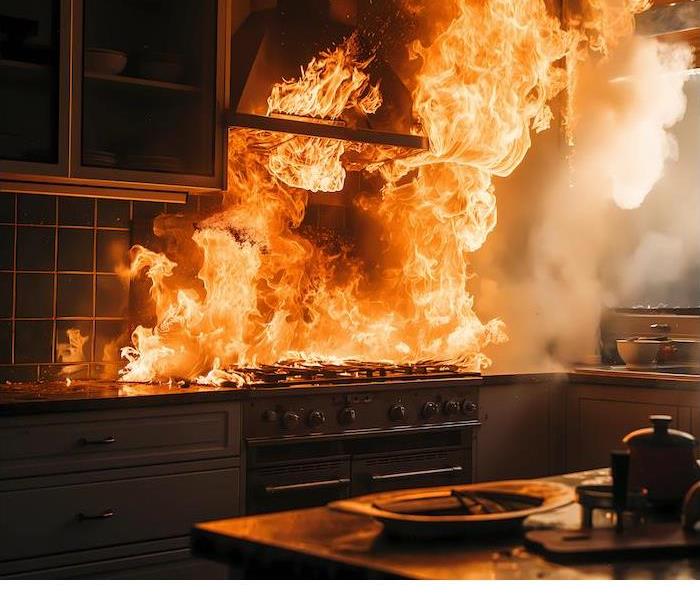 Celebrate Thanksgiving safely! Follow our fire safety tips to protect your home and loved ones during the holiday. Learn more today!
Celebrate Thanksgiving safely! Follow our fire safety tips to protect your home and loved ones during the holiday. Learn more today!
Thanksgiving is a cherished time for families to gather, share delicious meals, and create lasting memories. However, it’s also a period when kitchen mishaps can turn joyous celebrations into emergencies.
At SERVPRO of Buffalo/Tonawanda, we’re dedicated to helping you enjoy a safe and worry-free Thanksgiving. Here are some vital tips for Thanksgiving fire safety, including guidance on how to deep fry a turkey without putting your home at risk.
Maintaining a Safe Kitchen EnvironmentThe kitchen often becomes the bustling hub of activity during Thanksgiving, but it can also pose fire hazards if proper precautions aren’t taken. To create a safe cooking environment, begin by ensuring that flammable materials like dish towels and paper products are kept away from the stove. Always keep an eye on what you’re cooking, especially when using oil or open flames.
If you need to step away, even for a moment, make sure to turn off the heat to prevent accidents. It’s also crucial to have a fire extinguisher accessible in the kitchen and to familiarize everyone in your home with how to use it in case of an emergency.
Safely Deep Frying Your TurkeyDeep frying a turkey is a popular method for achieving crispy, flavorful results, but it requires careful handling to avoid Thanksgiving fire hazards. Always set up your fryer outdoors, far from your home, garages, and overhanging branches.
Choose a stable, flat surface to reduce the risk of spills. Before heating the oil, ensure your turkey is completely thawed and dry, as water and hot oil can lead to dangerous splattering. Keep a close watch on the oil temperature and never leave the fryer unattended. If a fire does occur, avoid using water to extinguish it; instead, use a fire extinguisher designed for grease fires.
Post-Cooking Safety MeasuresAfter you’ve enjoyed your Thanksgiving feast, maintaining fire safety remains essential as the celebrations continue. Make sure all cooking appliances are turned off and don’t leave leftovers out for too long. Properly dispose of cooking oil to eliminate any fire risks associated with used oil. When you’re tired after a long day, resist the urge to leave hot pots or pans unattended on the stove; allow them to cool completely before cleaning or putting them away. Remember, fire safety is a continuous responsibility throughout the holiday.
Thanksgiving is a time for gratitude, family, and delicious food, but safety should always be a top priority in the kitchen. By following these Thanksgiving fire safety tips, including safe methods for deep frying a turkey, you can ensure a festive celebration without any worries.
Should a fire occur in your home, SERVPRO of Buffalo/Tonawanda is ready to assist with fire damage restoration and cleanup. Wishing you a safe and happy Thanksgiving! For more information on fire safety and restoration services, don’t hesitate to reach out to us today.
Fire Safety Tips for the Summer Months | SERVPRO of Buffalo/Tonawanda
8/1/2024 (Permalink)
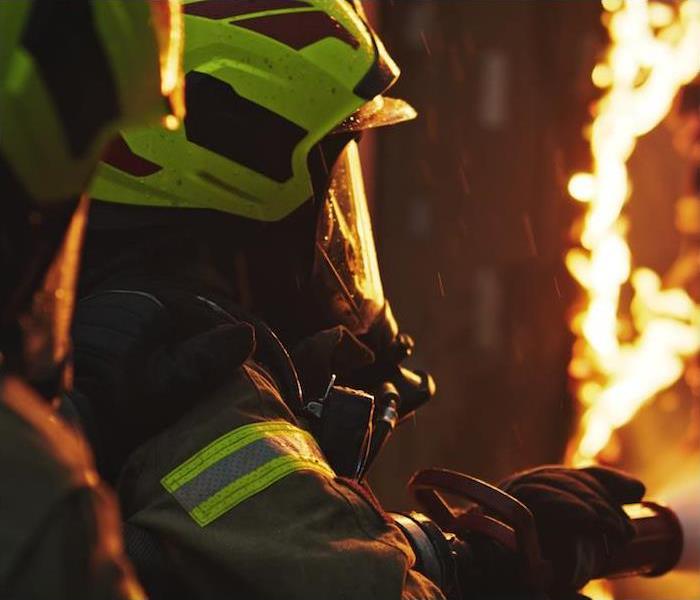 SERVPRO of Buffalo/Tonawanda is ready to help you have a fire-safe summer season with these helpful tips!
SERVPRO of Buffalo/Tonawanda is ready to help you have a fire-safe summer season with these helpful tips!
Summer is a time for outdoor enjoyment, but it also brings increased fire hazards that require careful attention to safety. Whether you’re grilling in the backyard, gathering around a campfire, or simply enjoying the warmth at home, following these essential fire safety tips can help you prevent accidents and ensure a safe summer season.
Grilling SafetyGrilling is a popular activity during summer gatherings, but it can pose significant fire risks if not handled properly. Always place your grill in a safe location away from any structures, including your home, deck railings, or overhanging branches. Choose a stable surface and inspect the grill before each use, ensuring it’s free of grease buildup, which can easily ignite and cause fires.
While cooking, never leave the grill unattended. Keep a close watch on the food and be prepared to act quickly in case of flare-ups. It’s essential to have a fire extinguisher nearby and know how to use it effectively. After grilling, allow the coals to cool completely before disposing of them in a metal container.
Campfire SafetyEnjoying a campfire is a cherished summer tradition, but it requires responsible practices to prevent wildfires and ensure personal safety. If you’re camping or having a backyard fire pit, choose a designated area that is clear of dry grass, leaves, or overhanging branches. Use a proper fire pit or ring to contain the fire and prevent sparks from spreading.
Always keep a bucket of water, a hose, or a shovel nearby to extinguish the fire completely when you’re done. Stir the ashes and douse them with water, ensuring they are cool to the touch before leaving the site. Never leave a campfire unattended, and educate children about fire safety rules to prevent accidents.
Home Fire SafetyEven at home, fire safety remains crucial, especially with the increased use of electrical devices and outdoor activities. Test your smoke alarms monthly to ensure they are working correctly, and replace batteries annually. It’s also essential to have carbon monoxide detectors installed, particularly if you use gas-powered appliances or have an attached garage.
Inspect electrical cords and devices for any signs of damage or wear. Avoid overloading outlets with multiple appliances, which can lead to overheating and potential fires. If using outdoor electrical equipment, ensure it is rated for outdoor use and is connected to a ground fault circuit interrupter (GFCI) outlet.
During celebrations involving fireworks, exercise caution and follow local laws and safety guidelines. Always have a bucket of water or a hose nearby to extinguish fireworks properly after use. Supervise children closely when handling fireworks and never aim them at structures, people, or flammable materials.
Staying Safe With SERVPROBy incorporating these fire safety tips into your summer routine, you can enjoy the season with peace of mind, knowing you’ve taken steps to protect yourself, your loved ones, and your property from fire hazards. Prevention is key to avoiding accidents, so stay vigilant and proactive in maintaining a safe environment.
Contact SERVPRO of Buffalo/Tonawanda for any fire damage restoration needs. Our team is available 24⁄7 to assist you. Stay safe and enjoy your summer responsibly!
Grill Safety: Protecting Your Summer BBQs | SERVPRO of Buffalo/Tonawanda
6/3/2024 (Permalink)
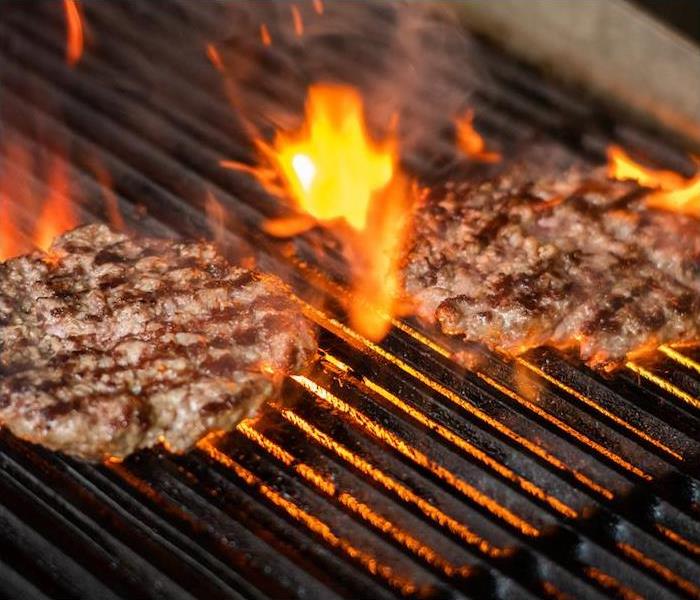 Gather around the grill, but don't forget about fire safety! Follow these tips from SERVPRO of Buffalo/Tonawanda to ensure a fun and safe night.
Gather around the grill, but don't forget about fire safety! Follow these tips from SERVPRO of Buffalo/Tonawanda to ensure a fun and safe night.
As the summer sun shines bright, the enticing aroma of barbecue fills the air. Backyard grilling is a favorite pastime for many during the warmer months, bringing family and friends together for delicious meals and great memories.
However, it’s crucial to prioritize safety to prevent accidents and ensure a worry-free experience. Here are some essential grill safety tips to keep in mind this summer.
Proper Grill PlacementThe first step to grill safety is proper placement. Pay close attention to where you set up your grill:
Grill Outside: Never grill indoors, including garages or enclosed areas. Indoor grilling can lead to carbon monoxide buildup, posing a serious health risk.
Maintain Distance: Keep your grill at least 10 feet away from your house, deck railings, or any flammable materials. This distance helps prevent fires from spreading.
Level Surface: Place your grill on a flat, stable surface to prevent tipping over. Avoid placing it on uneven ground or surfaces that could cause it to wobble.
Safe Grilling PracticesOnce your grill is properly set up, follow these safety guidelines while cooking:
Never Leave Unattended: Stay close to your grill at all times while it’s in use. Leaving it unattended even for a moment can lead to accidents.
Use Long-Handled Tools: Keep a safe distance from the flames by using long-handled grilling utensils. This minimizes the risk of burns and keeps you safe.
Keep Flammables Away: Keep flammable items like paper towels, dishcloths, and plastic utensils away from the grill. Store them in a safe location to reduce the risk of fire.
Fire Safety TipsIn case of a fire, knowing how to respond quickly and effectively is crucial. Here’s what to do:
Have a Fire Extinguisher: Make sure you have a fire extinguisher nearby whenever you’re grilling. Familiarize yourself with its operation, and keep it easily accessible in case of emergency.
Control Grease Buildup: Clean your grill regularly to prevent grease buildup, which can ignite and cause a fire. Use a grill brush to remove excess grease and food residue after each use.
Know When to Call for Help: If a fire gets out of control, don’t hesitate to call 911. It’s better to seek professional help immediately rather than risk personal injury or property damage.
By following these grill safety tips, you can enjoy delicious meals with family and friends without worrying about accidents or injuries. Remember, safety is key to a successful and enjoyable grilling experience.
Our team is here to help you enjoy a worry-free summer season. Contact SERVPRO of Buffalo/Tonawanda today if your home is damaged in a fire.
Tips for a Toasty and Fire-Safe Winter Season | SERVPRO of Buffalo/Tonawanda
1/16/2024 (Permalink)
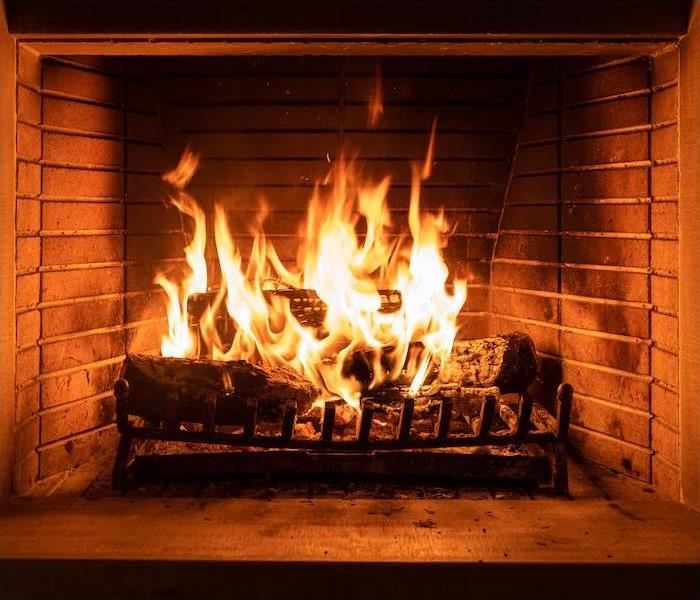 Fire safety is a top priority for us at SERVPRO of Buffalo/Tonawanda this winter. Keep your home safe with these helpful tips!
Fire safety is a top priority for us at SERVPRO of Buffalo/Tonawanda this winter. Keep your home safe with these helpful tips!
The winter season in the Buffalo area sure is a dynamic one! We are always prepared for intense snowstorms, high winds and sub-zero temperatures, which means that all of us are spending much more time indoors as a result.
As you start fires or turn on space heaters in order to stay warm, your risk of suffering a house fire goes up. We want you to avoid starting a serious fire this winter, so check out our tips below for staying safe without sacrificing your comfort.
Taking Care of Your FireplaceWe can all appreciate the ambiance and warmth that a fireplace can bring, but they are also the source of hundreds of uncontrolled house fires. Properly cleaning and preparing your fireplace is key to your safety. Clean out ash buildup and creosote on your chimney walls and inspect the bricks for signs of wear-and-tear or cracking.
Reduce the amount of flammable materials in your room, especially near the fireplace opening and the mantle. The room that your fireplace is in should have a smoke detector, so check it regularly and replace the batteries as needed. If your fireplace is electric or gas, you need to be checking the lines regularly for leaks and consider installing a carbon monoxide alarm next to your fireplace.
Setting Up Space HeatersSpace heaters are a convenient way to stay warm, but that convenience is also what makes them dangerous from time to time. In fact, space heater mishaps cause 1,700 house fires every year.
Set yourself up for success by setting up your heater on a level, nonflammable surface that is far away from things like curtains or cushions.
You should also create a three-foot barrier around your heater to keep out kids and pets and be sure the cord is laying flat against the ground to avoid tripping hazards. Never leave your space heater on while it is unattended, and always turn it off and unplug it before going to bed.
Additional Safety FeaturesNot every space heater is a good choice for you. Just because one is on sale or you can get one for really cheap doesn’t necessarily mean it is a good deal! Do your research before buying anything and always read reviews.
First, focus on choosing a company that is reliable and that has passed all safety certifications. Newer models of space heaters can also come with emergency shutoff switches that are programmed to turn the heater off after a certain period of time. This switch can come in handy if you forget to turn yours off at the end of the night and is definitely a safety feature worth including in your requirements for purchase.
In addition, you should take some time to inspect the cord that would power the heater. It should be sturdy, well-made and at least six feet long. This distance allows you to set up your heater in a safe location away from walls or furniture.
Stay toasty warm out there, everyone! If you do end up suffering from fire damage this winter, call SERVPRO of Buffalo/Tonawanda right away so we can handle your entire restoration.
A quick fire damage restoration is just a phone call away. Call SERVPRO for immediate assistance.
Prep for the Holidays in a Fire-Safe Way | SERVPRO of Buffalo/Tonawanda
11/17/2023 (Permalink)
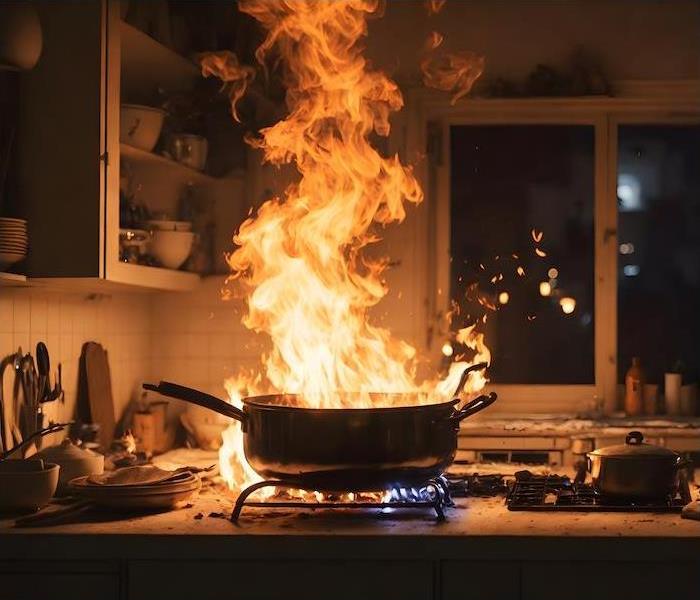 Fire damage in your home? Not for long with SERVPRO of Buffalo/Tonawanda on the case!
Fire damage in your home? Not for long with SERVPRO of Buffalo/Tonawanda on the case!
The holly jolly holiday season is here, and we are so excited about it! This time of year brings everyone together for family parties and events, and we are sure you gather around the dinner table to toast to another year well-lived.
Whether you are in charge of preparing all of the food for an upcoming party or you volunteered to bring your world-famous cranberry sauce, you will be in the kitchen cooking away.
Kitchen fires increase at this time of year, and a single accident or oversight could leave your entire home damaged quickly. Practicing fire-safe kitchen strategies can help reduce your risk of starting a fire while you are making your delicious food.
Preparing Your SpaceYou should always take the time to prepare your space before you even turn on a burner or preheat your oven. Many kitchen fires start because there are too many flammable objects near flames or heat, so clearing excess clutter can help reduce this risk.
Removing pot holders, oven mitts, wooden utensils and holiday decorations is essential. Even just a single spark or popped grease bubble can travel to a flammable object and start a blaze instantly.
In addition, you should also be aware of what you are wearing in the kitchen. Cute holiday outfits or decorative aprons may put you in a seasonal mood, but they can be dangerously flammable in the right circumstances. Keep loose clothing to a minimum, and roll up your sleeves before you get to work.
Stay Near Your Cooking FoodDon’t ever leave the kitchen while your food is cooking. Leaving the kitchen for any amount of time can cause a potential fire to catch and spread, resulting in your entire kitchen being in flames by the time you get back. Grilling, frying, boiling and baking can all be dangerous, so be aware of your surroundings no matter what kind of cooking you are doing.
If your family loves to deep-fry a turkey around the holidays, use extreme caution. Choose a flat, nonflammable surface to set up your fryer, and do not overfill it with oil.
Read all the directions and make sure to pull out your turkey to thaw days in advance so it is fully thawed all the way through. A partially frozen turkey can cause the oil to spatter and pop when it comes into contact with the turkey.
Check Your Smoke DetectorsProper kitchen safety strategies can help reduce your risk of suffering a kitchen fire, but we all know that fire is unpredictable. This is why having protective measures in place is crucial!
Each level of your home should have a smoke alarm, and one should ideally be near or in your kitchen. Check the batteries every month and change them regularly as they expire.
You should also make sure a fire extinguisher is designated to stay in your kitchen. Being able to quickly extinguish a flame can stop a problem before it gets out of control. Note the expiration date on your extinguisher and replace it as necessary.
We want you to enjoy a safe and relaxing holiday season, but remember that we are always here for you if you do suffer a house fire. We will clean, sanitize and rebuild your home as quickly as possible so you can get back to the festivities right away.
House fires can happen in the blink of an eye. Contact us for a quick restoration day or night!
Staying Safe During Your Fall Bonfires | SERVPRO of Buffalo/Tonawanda
9/18/2023 (Permalink)
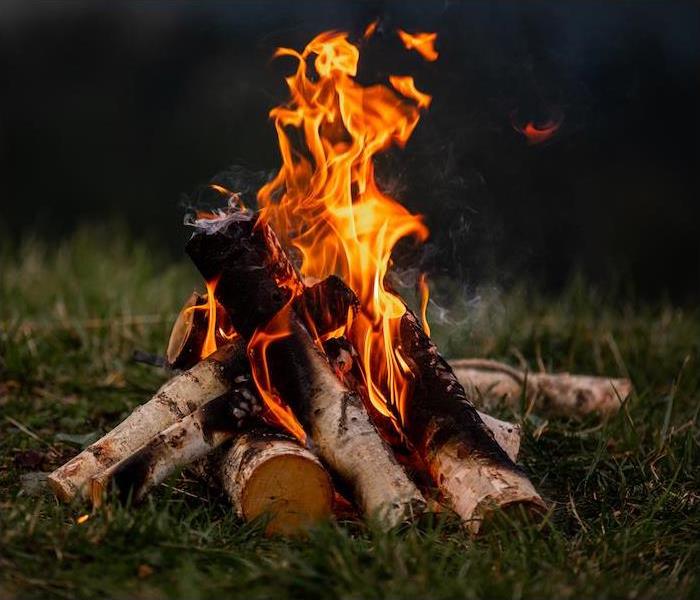 Bonfire season is upon us! SERVPRO of Buffalo/Tonawanda has your back with these helpful fire safety tips.
Bonfire season is upon us! SERVPRO of Buffalo/Tonawanda has your back with these helpful fire safety tips.
Can you believe that we are already entering the fall season here in the Buffalo area? We are certainly glad to see the seasons changing, and we look forward to all of the fun holidays and family time ahead.
In addition to all of the fall decorations, apple orchards and pumpkin patches, one common fall activity is a good bonfire. While fall bonfires can be a cozy way to welcome in the changing seasons, the risk of starting an out-of-control fire is always there.
Our SERVPRO® of Buffalo/Tonawanda team wants you to enjoy this time of year with a small, crackling fire, so read on to learn more about responsible bonfire practices.
Starting Up Your BlazeDo choose a safe location for your fire pit. Portable pits can be moved around to find a level surface far away from buildings or garages, but permanent pits aren’t as mobile. Remove any brush or log piles that are too close, and trim any trees that are hanging over the pit.
Do have a water source nearby for emergencies. An unraveled hose or a bucket full of water can easily snuff out a quickly growing fire. A shovel and some dirt is also a reliable option if you aren’t near any water sources.
Do keep an eye on the conditions. Windy days or dry conditions can make it more dangerous to have a fire, so obey any local burn bans and choose another day to start a fire.
Tips for Managing a FireDon’t use any sort of accelerant to start your fire or keep it going. Gas and lighter fluid may be flammable, but they can be unpredictable and downright dangerous to use.
Don’t let your children play too close to the flames, and keep your pets away from the fire pit. Accidents can happen in seconds and either lead to serious injury or a quickly spreading fire.
Don’t let the flames get too high. Large fires are much harder to control, so keeping yours small allows you to quickly extinguish any fire situation that is getting out of hand.
Don’t go inside or leave your fire pit until the flames and embers are completely extinguished. Pour water over everything until the logs and ash are cold to the touch.
Wildfires and PeopleWhile wildfires can start by lightning strikes or other acts of nature, most wildfires are actually caused by humans. In order to reduce your risk, stay close to your fire, keep it small and maintained, and never burn on any days where the conditions aren’t right.
Remember, fire can be unpredictable and cause all kinds of damage even if you follow all these tips. Call us right away for a complete fire damage restoration.
Fire can cause a lot of damage in a short amount of time. Contact us day or night for immediate assistance.
Enjoying Your Backyard BBQ Without Starting a Fire | SERVPRO of Buffalo/Tonawanda
8/10/2023 (Permalink)
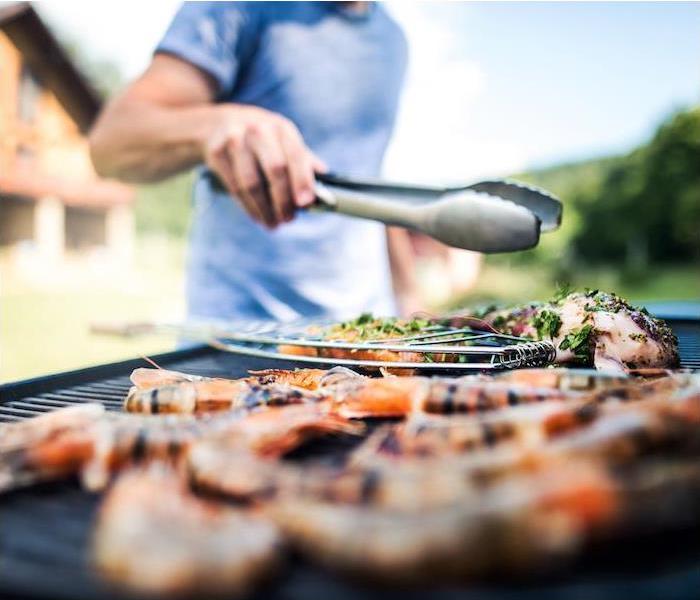 Have you had a barbeque gone wrong? Call SERVPRO of Buffalo/Tonawanda to get your space back in shape.
Have you had a barbeque gone wrong? Call SERVPRO of Buffalo/Tonawanda to get your space back in shape.
Summertime in the Buffalo area is always a season to embrace with open arms. It’s warm, it’s sunny and there is so much to see and do around here. One of our favorite activities is dusting off our BBQ grills and enjoying an afternoon with family and friends, and we are sure it’s one of your favorite pastimes as well!
But before you fire up your own grill, you need to make sure you are setting yourself up for success. July is the peak month for grill fires, and we want you to be safe and enjoy your party without the risk of fire. Our SERVPRO® of Buffalo/Tonawanda team explains some helpful fire prevention tips below.
Setting Up Your Space SafelyThe first step is to find a space to put your grill that is both outside and away from anything combustible. That may sound obvious, but this also includes your garage even with the door open and any overhangs off of the roof. Your grill needs to vent safely as well as have a safe place for that heat and smoke to go.
It should also be at least 10 feet away from the side of your home or a deck railing. This barrier should be a kid-free and pet-free zone as well, as a single accident could lead to the grill tipping over or a severe burn.
Next, it is time for inspections! Charcoal grills should be clean and free of ash buildup, and don’t forget to check the basin for dents, cracks or deformities. Propane grills should be cleaned as well and you should be checking the gas lines to make sure they are secure. A leaky line could be causing a slow gas leak, which is a huge safety concern and fire hazard.
Controlling the FlamesOnce you have lit your grill and are cooking away, stay close by to man the flames. You should have your hose or fire extinguisher ready to use at a moment’s notice, and consider keeping a spray bottle nearby to help knock down smaller flames or sparks.
After the food is grilled to perfection, start the process of shutting everything down. Scatter the coals of your charcoal grill and close the vents, or close gas lines and propane tanks on your propane grill. Remove any ash buildup and put it into a metal can. Before you retire for the night, go outside one more time to check that everything is cooled and the fire is completely out.
We hope you enjoy the rest of your summer and take advantage of the great weather here in the Buffalo area. Remember, accidents can happen at any time regardless if you do your best to avoid them, so call SERVPRO of Buffalo/Tonawanda for a fast restoration day or night.
Don’t let fire damage linger in your home. Call us at SERVPRO of Buffalo/Tonawanda for a fast restoration.
Introducing Fire Safety to Your Kids | SERVPRO of Buffalo/Tonawanda
6/14/2023 (Permalink)
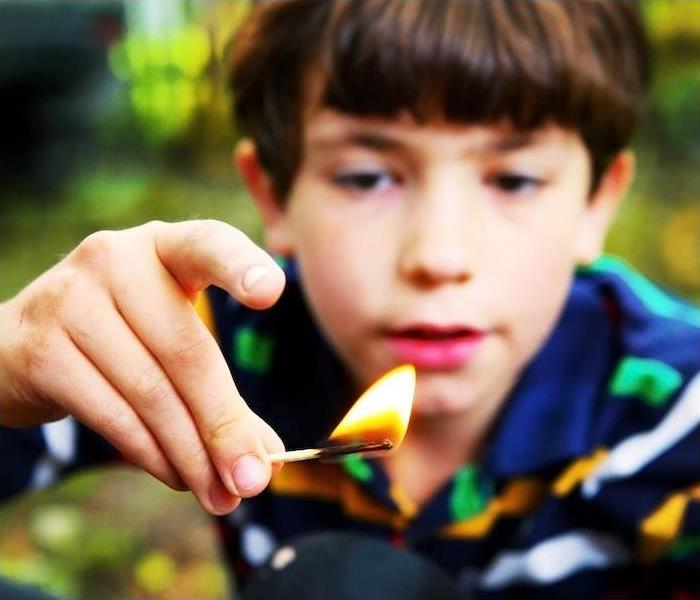 SERVPRO of Buffalo/Tonawanda is here for you and your family if you experience a fire in your home or business.
SERVPRO of Buffalo/Tonawanda is here for you and your family if you experience a fire in your home or business.
If you have children, you know just how much work it is to raise them right and teach them about the world around them. You also know just how many questions a little kid can ask in a day! Your kids are learning new things and concepts every day, and it is your responsibility to help keep them safe and informed as they grow.
One crucially important topic to discuss with your kids is fire safety. House fires are not only destructive, but they can be dangerous to everyone in your household.
By introducing fire safety in a fun and non-threatening manner, you can increase the likelihood of your children responding quickly and correctly in the event of a real emergency.
Teaching the Concept of FireMany kids learn through experience, and it can be hard for them to understand cause and effect until it is actually happening. This is especially true with fire! Discuss with them how different fires can start and how they spread, and take a walk through your home together and find the places that produce fire, like bonfire pits, your stove and the candles around the house, and discuss fire safety at each place.
It is also important for your children to understand the dangers of matches and lighters in the wrong hands. Explain that these items are tools for adults to use and are never toys. A curious child and a lighter can lead to devastating consequences.
Introduce Them to AuthorityMany kids want to become police officers or firefighters when they grow up, but can be easily intimidated by these men and women in uniform. Try to expose your children to authority figures by reading books about them and consider attending local community events where they are present. Meet-and-greets can help reinforce the concept of friendly heroes and what these people would look like if they were to come to their home.
Explain to them what would happen in the event of a fire and how these people would show up to help everyone. In most cases, they would show up once everyone is outside, but in the small chance that your child is unable to get out on his or her own, needs to be comfortable with yelling for help. Make it fun by seeing who can yell their name the loudest in their rooms and practice army crawling through the house.
The Benefits of an Escape PlanIf you don’t already have an emergency exit plan, make it a priority to create one soon. Let your children lead this process, and make it fun! Challenge them to find all of the ways out of each room in your home and time them to see how fast they can get out. Then sit down and draw out the map together.
Your windows are often-overlooked exits because you normally don’t let your children play with them—for good reason. However, in a true emergency situation, your children need to know how to open them. Explain how they work, and reinforce the idea that the windows are never to be used as a toy and only for emergencies.
Lastly, practice running to your outdoor meeting place that is far enough away from your home. Put it all together and practice your entire plan at least twice a year, and be sure your children know how to call 911.
Fires can cause widespread damage. Call us for a thorough and efficient restoration.
A Fire Caused by a Space Heater in Buffalo, NY
4/18/2022 (Permalink)
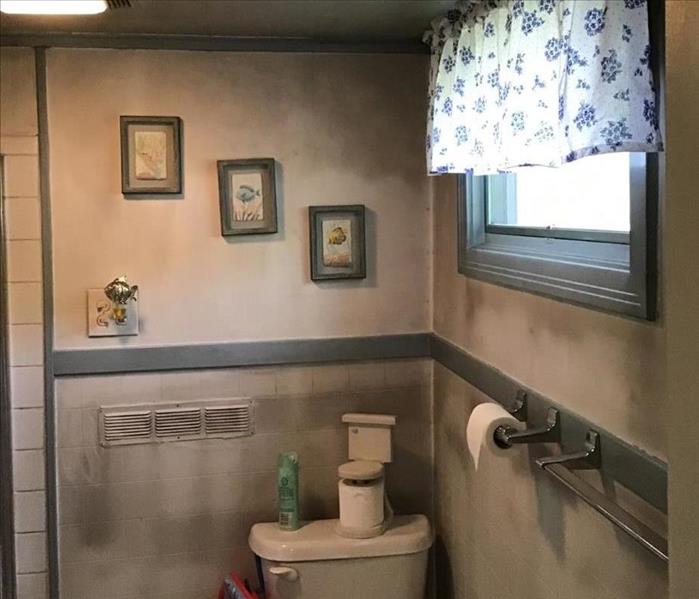 A space heater was left unattended and caused a small fire in a bathroom in Tonawanda, NY
A space heater was left unattended and caused a small fire in a bathroom in Tonawanda, NY
Space heaters can be a fire hazard in fact according to the National Fire Protection Association, heating equipment is the leading cause of fires in the United States. Many residential fires are caused by space heater units and are responsible for several deaths every year. It is wise to replace old units with new models that have the automatic turn off feature, should it tip over.
Some other safety tips are:
-Check for frayed wires.
-Never use an extension plug or a power strip
-Keep all loose objects away from it and give it space
-Know how your space heater works
-Keep heaters away from children and pets
-Only use if you are staying in the room, never leave unattended
-Make sure your smoke detectors are working
Be safe and be smart. Every year SERVPRO of Buffalo - Tonawanda will clean a couple of homes that had a space heater fire causing structural damage, soot, and odor throughout a home.
Odors After a Fire
4/15/2022 (Permalink)
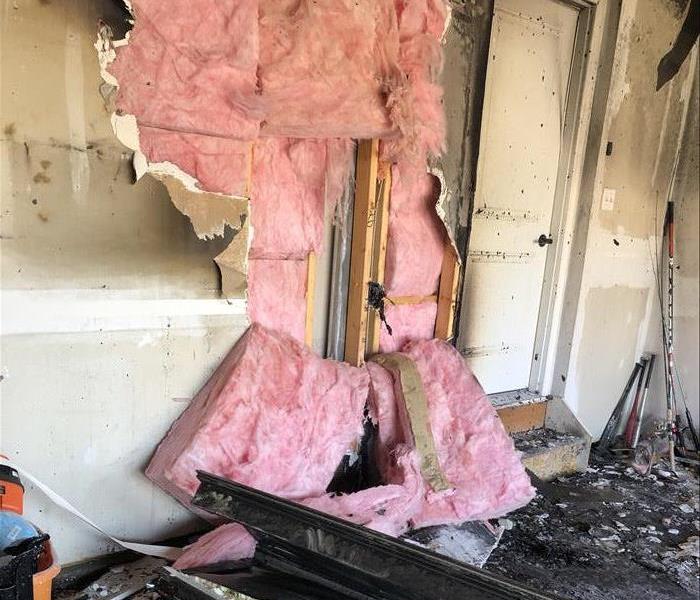 Many times the insulation in attics can hold fire smoke odor.
Many times the insulation in attics can hold fire smoke odor.
During a home fire, there are so many troubles and worries that a homeowner will face. Knowing how troublesome home emergencies are was the inspiration for SERVPRO of Buffalo - Tonawanda to become a thing. SERVPRO of Buffalo - Tonawanda partners with homeowners and businesses to make fire damages "Like it never even happened®". But how do they take care of the aftermath of fire damages, like smoke damages?
Smoke damages are one branch of the different types of fire damages, but it is important to understand the behavior of smoke. Smoke rises to the upper levels of structures, so during the fire damage mitigation process, the technicians at SERVPRO of Buffalo - Tonawanda will inspect and examine all upper levels of a structure to inspect for soot and odor. If the fire is on a second floor, attic insulation can trap smoke and allow the smell to linger, long past the fire. SERVPRO of Buffalo - Tonawanda’s team will remove the odorous insulation and then use special cleaning solutions and techniques to remove the smell from a home.
Grilling Safety
4/15/2022 (Permalink)
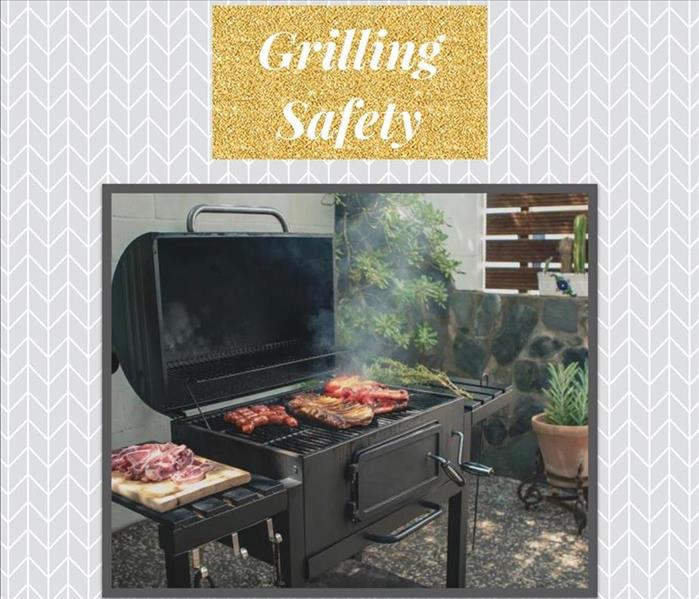 Who else is excited for grilling season ?
Who else is excited for grilling season ?
Spring and warm temperatures are finally beginning here in Buffalo, NY and it’ll only be a manner of time before we start the grilling some tasty food. We at SERVPRO can’t wait to start grilling some steaks in the warm temperatures, but be sure to follow these fire safety tips to avoid any fire damage while grilling.
- Keep your grill at least 10 feet away from your home and avoid having any decorations near the grill. Keeping items clear of the grill will help ensure that the flame from the grill doesn’t spread.
- Clean grease and fat from your grill regularly. Giving your grill a regular cleaning will prevent buildup of these flammable materials.
- If your grill is a gas grill, check for gas leaks. Cover the gas hoses in soapy water and check for bubbles forming in the soap.
- Keep a fire extinguisher near your grill in case of an emergency.
- Never leave your grill unattended
These tips should help you have a safe grilling season. Enjoy those burgers and hot dogs! Should anything happen, SERVPRO is here for you.
Easter Candle Safety
4/11/2022 (Permalink)
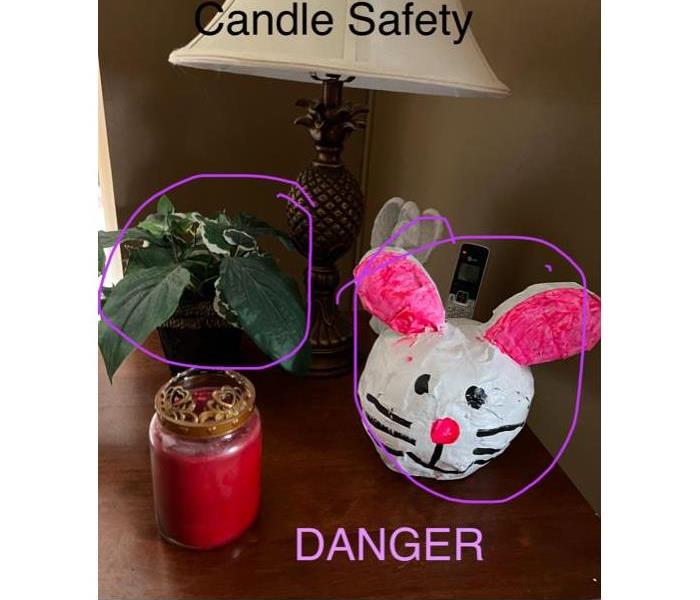 It only takes seconds for an accident to happen. Make sure all obstacles are away from candles that could catch on fire.
It only takes seconds for an accident to happen. Make sure all obstacles are away from candles that could catch on fire.
Easter is around the corner! When you are preparing for the holidays, keep in mind the dangers that can come along with it. Every Easter, SERVPRO of Buffalo - Tonawanda responds to several homes for fire related incidents. An unattended candle fire is one of main causes of a home fire during the holidays. They smell pretty, set a vibe, and look pretty but that can quickly turn into a disaster. Candles can catch curtains, paper, decorations, and tables cloths on fire. It is always a clever idea to blow the candle out when you leave the room and house. In addition to a fire hazard, candles can cause carbon deposits throughout your home. The carbon and soot will appear where nail heads and framing lay. Be sure to be safe this holiday season. Happy Easter from your friends at SERVPRO of Buffalo - Tonawanda.
Know Your Electrical Hazards in Your Buffalo Home
3/22/2021 (Permalink)
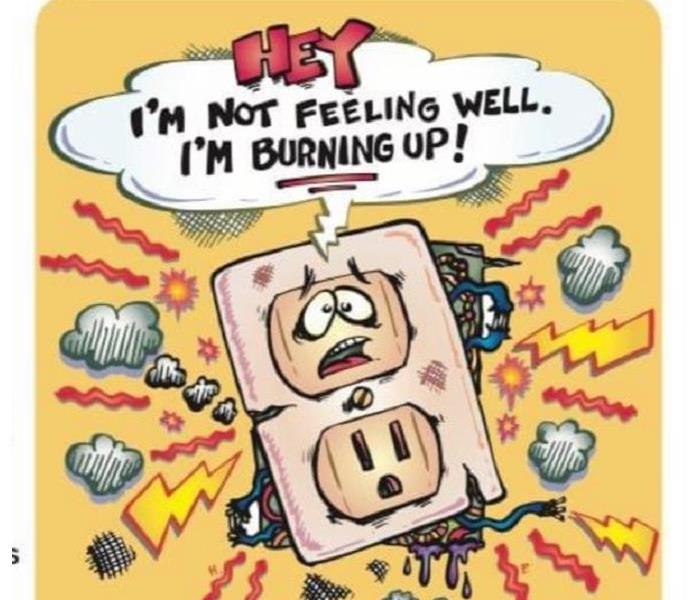 Always be safe!
Always be safe!
Electrical Fire Safety
The thought of an electrical fire is scary. Not knowing what is going on inside your walls, ceiling, attic, or garage and not knowing if an appliance or something plugged into an outlet could overload and malfunction. Electrical safety in a home is a must. Always have a qualified electrician perform all electrical work done. If your wiring is outdated, consider getting it updated. Make sure your home is up to code. If you are buying a home, make sure the home inspector checks all the electric to make sure it is in accordance with local requirements. Limit your appliances in single outlets, do not overload, especially heat producing appliances. Do not use extension cords for large appliances such as refrigerators, dryers, washers, stoves, and air conditioners. Be sure to have GFCI (ground fault circuit interrupters) in the kitchen, bathroom, garages, basements and outdoors. You test the GFCIs once a month to ensure they are working. Always check chords for cuts or fraying. Never place your cell phone under your pillow or leave sitting on your bed while charging it. Many of these tips are brought to you by the NFPA- National Fire Protection Association. SERVPRO of Buffalo - Tonawanda has participated in many fire prevention meetings and open houses. The cleanup of a fire is no stranger to us.
Kitchen Fire Cleanup by SERVPRO of Buffalo Tonawanda
3/20/2021 (Permalink)
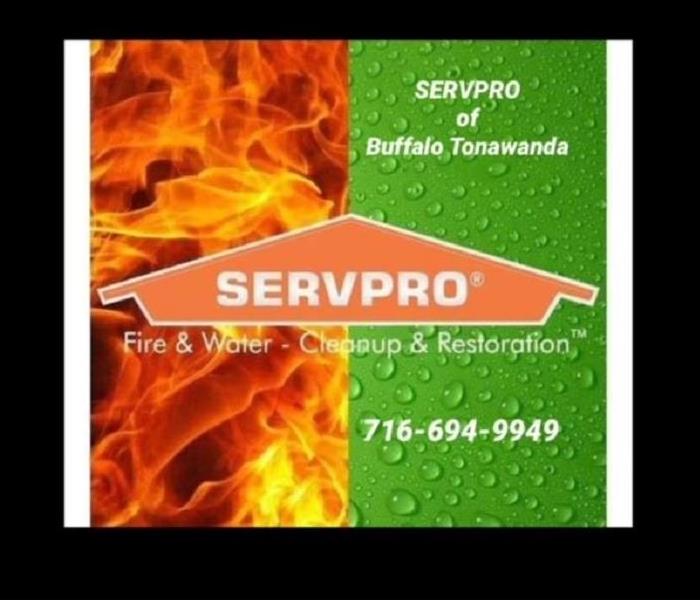 SERVPRO of Buffalo Tonawanda is just a phone call away!
SERVPRO of Buffalo Tonawanda is just a phone call away!
Kitchen Fires
Kitchen fires are scary and can be prevented. According to the NFPA, fire departments respond to 488 kitchen fires a day. 49% of house fires start in the kitchen. That is over 173,000 per year! 61% of fires in the kitchen were on cooktops or ranges. Kitchen fires are mostly caused by unattended cooking, combustibles too close to the heat source and unintentionally turning on or forgetting to turn off the stove. These types of fires will cause significant and costly damage to your home. Follow these prevention tips to keep your kitchen safe:
-Call 911 always!
-Never leave your home while cooking or unattended.
Keep appliances clean and in good repair.
-Unplug appliances when not in use.
-Install a smoke detector near the kitchen,
-Use caution lighting pilot.
-Do not use metal in a microwave.
-Do not overfill pans and pots with water or grease.
-Always have a fire extinguisher nearby and have a fire safety plan.
-Never throw water on a grease fire. Have baking soda available next to your fire extinguisher.
-Always stay home when using the self-cleaning feature
-Keep clutter away from the stove.
SERVPRO of Buffalo Tonawanda responds to several kitchen fires a year helping with the soot and odor removal.
Striving for Complete Customer Satisfaction
3/17/2021 (Permalink)
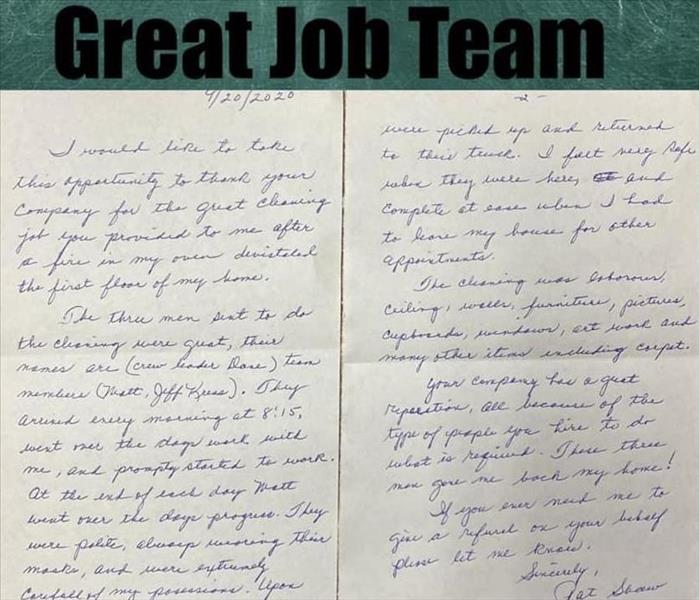 Just Another Happy Customer :)
Just Another Happy Customer :)
Receiving an outstanding satisfaction is nothing new for SERVPRO of Buffalo Tonawanda. We strive to be our best from the time the first call is received. We understand the importance of empathy, understanding, communication and making our clients happy at all levels. All SERVPRO franchises are individually owned and operated. SERVPRO of Buffalo Tonawanda has been serving the Western New York area since 1972 under the same family-owned name. Year after year we receive the highest levels of customer satisfaction resulting in repeat customers and clients. We built up the trust with the community and insurance industry with our honesty, service, and experience.
As a trusted leader in the restoration industry, SERVPRO has over 1,700 Franchises in the U.S. and Canada that are ready to help. SERVPRO of Buffalo / Tonawanda professionals have the advanced training and equipment needed to clean or restore your home. We also have the resources to respond faster to any size disaster. Learn more about our residential services:
Why does my home still smell after a fire?
2/25/2021 (Permalink)
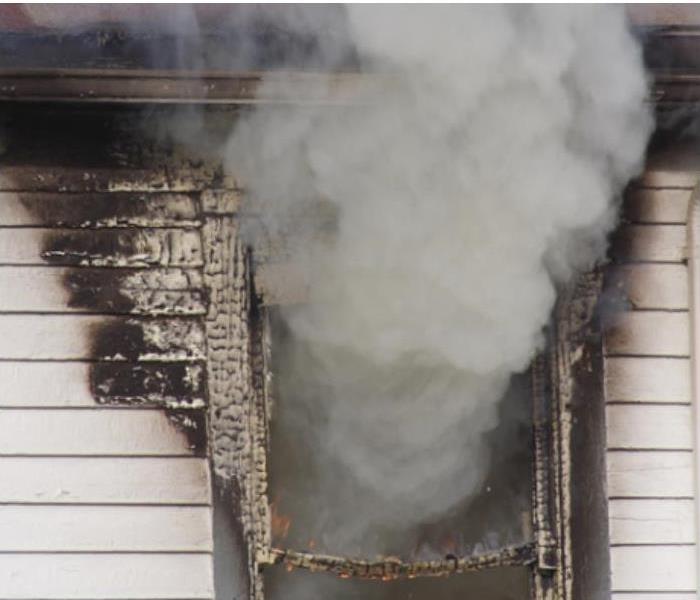 Smoke odor will persist unless properly cleaned.
Smoke odor will persist unless properly cleaned.
Fires of any size, big or small leave behind smoke damage. Homeowners who choose to cleanup on their own, often notice a persistent odor from the smoke. Soot is widespread after a fire and will encompass every inch of your home. Unless you are able to clean every single corner, the smell will continue to emanate. That’s why SERVPRO exists. We have a team of highly trained technicians and the proper equipment to deal with fire damage of any size. We can restore your property from any fire, soot, or smoke damage and return it to its pre-disaster condition. Our team will work to ensure that your home is clean and odor free. If you have experienced smoke damage, call SERVPRO of Buffalo/Tonawanda at 716-694-9949 and we’ll make it “Like it never even happened.”
Create Comprehensive Fire Evacuation Drills for Your Business | SERVPRO® of Buffalo/Tonawanda
6/25/2020 (Permalink)
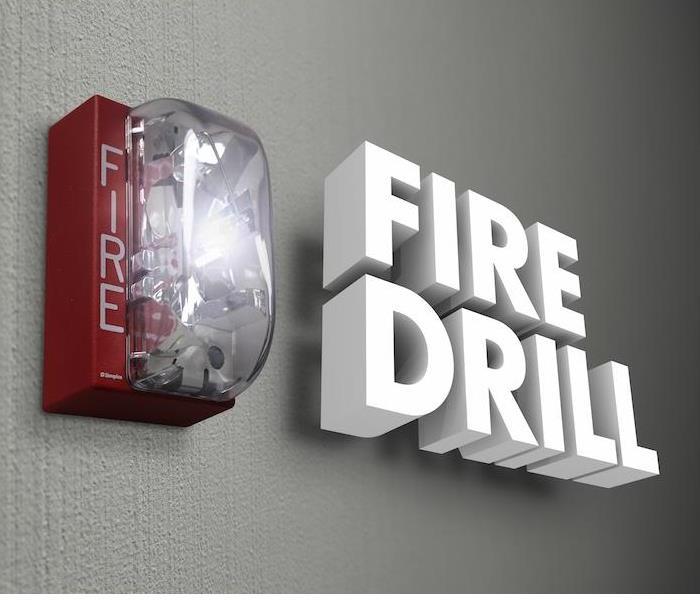 If your business experiences any fire damage, you can count on us. SERVPRO of Buffalo Tonawanda specializes in commercial fire restoration.
If your business experiences any fire damage, you can count on us. SERVPRO of Buffalo Tonawanda specializes in commercial fire restoration.
Planning for all possible scenarios is an important part of being a business owner, and that includes planning for emergencies such as fires. There are many commercial fire incidents annually, so it is something that is worthwhile to prepare for just in case.
Making sure your employees know what to do if a fire breaks out is of chief concern, and you can achieve this by planning out regular fire evacuation drills. This way everyone will rehearse what needs to be done in advance, so in a real fire situation, they will know what to do.
Preparing Your Staff for Fire EvacuationConsult with your local fire officials. Your local fire officials are a great resource for your business in all aspects of fire safety. Consult with them regarding your business and they will be happy to discuss the best fire evacuation routes and any special considerations you may need to take into account as you plan ahead.
Communicate and mark fire evacuation routes. Once you have determined the best evacuation paths from various points in the building, involving your employees is the next step. Make sure to round everyone up before you host your first drill so everyone can be clear on what path to take and what the protocol will be once the drill begins.
Have fire drills frequently. Hosting regular drills is the best way to make sure that the evacuation plan is solidified in everyone’s mind and reduce the likelihood of panic if a real fire were to start. Make sure that everyone can exit the building safely within a few minutes’ time each time you do the drill.
Run different fire scenarios. Fires can break out in a myriad of ways, so your evacuation drills should be comprehensive by taking this into consideration. Run through a different fire scenario each time that features blocked exits and varying fire origin spots so you can be certain that everyone is ready for any fire situation that may arise.
If your business has experienced fire damage, you can count on us. We specialize in commercial fire restoration and will be here for you at any hour—contact us today at 716-694-9949
Firework season is now in full swing
6/17/2020 (Permalink)
 This season enjoy your holiday and be safe.
This season enjoy your holiday and be safe.
It is getting really close to Independence day and that means backyard cookouts, family gatherings and of course fireworks. Here at SERVPRO we want you to have fun but also be safe and practice safety first when it comes to handling fireworks, With the country in the state it's in it is easy to get overwhelmed and excited about being able to get out of the house and celebrate with others. This being said please use caution when handling fireworks and flammable items in the summer heat. One good practice is keep fireworks in a shady non flammable area away from grills and fire pits. we all know it only takes one spark to ignite flammable fireworks. So please enjoy your summer, take care of each other and practice safety while enjoying the weather. If something should happen please give us here at SERVPRO a call. We can help with your fire restoration needs.
A How-To Guide for Handling Fire Damage to Your Home | SERVPRO® of Buffalo/Tonawanda
6/9/2020 (Permalink)
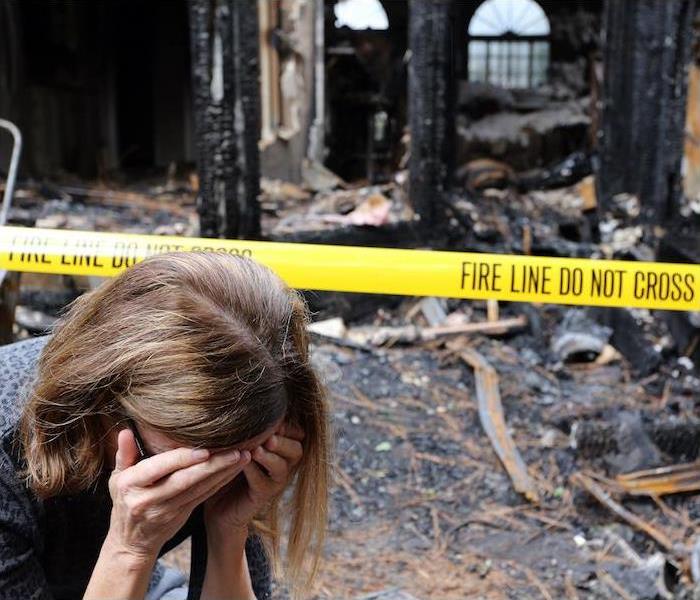 If your home is damaged in a house fire, SERVPRO of Buffalo Tonawanda is here to help. Contact us for any fire restoration needs.
If your home is damaged in a house fire, SERVPRO of Buffalo Tonawanda is here to help. Contact us for any fire restoration needs.
The process of surviving and recovering from a house fire is not something to be taken likely. Regardless of how big the fire was or how rapidly it was extinguished, damages can be extensive and the trauma of the experience can be significant.
Though recovering from a fire is also an overwhelming process, our how-to guide will help you handle it. Here are our tips for recovering from residential fire damage:
Our Tips to Recovering From Residential Fire DamagePrepare yourself for what to expect. While it is easy to find pictures of fire-damaged buildings in the news, experiencing that with your own home is a different feeling entirely. The damage from a fire can be extensive and can spread to far reaches of the home that were nowhere near the initial flames. It is important to prepare yourself mentally for seeing this, as it can be an emotional experience.
Wait to enter your home. Though the fire-impacted area may take up a small portion of your home, hidden dangers can be lurking anywhere in the house due to structural or electrical damage a fire may have caused. Never enter your home before the firefighters provide guidance that it is safe to do so to avoid further complications.
Contact your insurance company. After you are able to access your home and take in the damage, you will want to call your insurance company quickly. Every homeowner policy is different, so you will want to be certain you get all the details regarding how to proceed with filing a claim before you do anything else.
Document the damages. Thorough documentation of the damage done to your home—including an inventory list with photos—will allow you to keep track of what has been damaged both for yourself and for your insurance company. Because it can be so overwhelming, staying organized can go a long way.
Contact your restoration company. The restoration company you decide to work with is one of the biggest factors in how quick and smooth your recovery process is. The lingering trauma from a fire can be persistent, so having a company that has your best interest in mind can do wonders for making the process as painless as possible.
If your home is damaged in a house fire, you can count on us to help you. Get in touch at any hour for a quick response.
Being Prepared for Fires at Your Business | SERVPRO® of Buffalo/Tonawanda
2/24/2020 (Permalink)
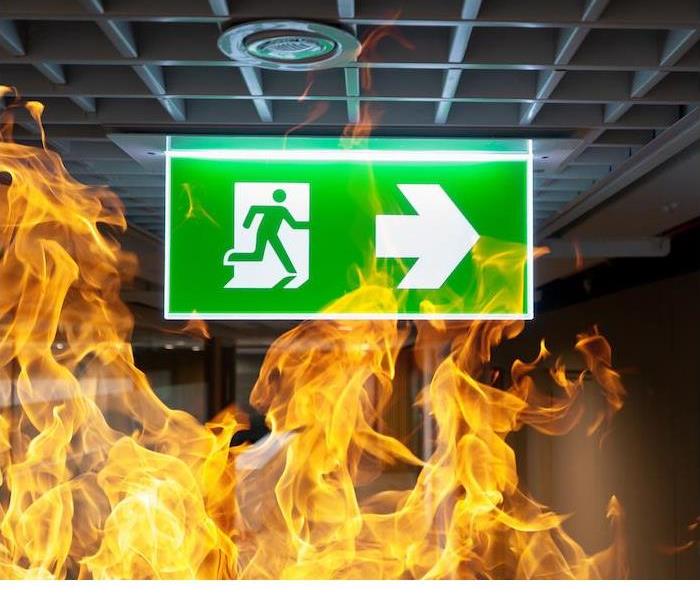 For business owners, preparing for fires in the workplace is not something to take lightly.
For business owners, preparing for fires in the workplace is not something to take lightly.
Commercial fires are extremely common and can have a big impact on your livelihood, as well as the safety of your staff.
By increasing your preparedness measures, you can be sure you are doing everything you can to prevent a fire from starting and to stay safe if one does.
By being honest with yourself about your likely risks, checking your equipment regularly, and helping your staff be educated and prepared, you can easily reduce the risks of a fire at your workplace. Here are some of the top workplace fire preparedness tips to help you get started:
Fire Preparedness in the Workplace
Follow code guidelines and inspection schedules. Businesses have fire codes they must follow, set forth by the National Fire Protection Association. It is important to make sure you are up to code as an essential first step for fire preparedness and make sure you keep up with scheduled inspections to ensure your equipment is working properly.
Identify your specific risks. Every building has some level of fire risk, but certain businesses have specific qualities that might lead to a heightened danger level. Consider anything such as hazardous chemicals, cooking equipment or heavy machinery that might contribute to your risk so you can be better prepared for safety surrounding it.
Create (and practice) a fire evacuation plan. In the event of a fire, officials estimate you only have around two minutes to evacuate the building. Making sure your staff has several options for exits and practices a quick escape from the building before a fire starts will reduce panic in case a real fire occurs.
Have regular fire safety seminars with staff. Meeting with staff regularly to review fire safety tips will make sure that new hires, those who work irregular schedules and everyone else on the premises is aware of and prepared for the fire risks in the building. Be sure everyone knows what to do when the fire alarm sounds, where extinguishers are located and any other tips specific to your building that should be noted.
If your business has experienced a fire, we’re here 24⁄7 to respond and begin restoration. Call us today to learn how we can help you.
Common Causes of Home Fires
1/5/2020 (Permalink)
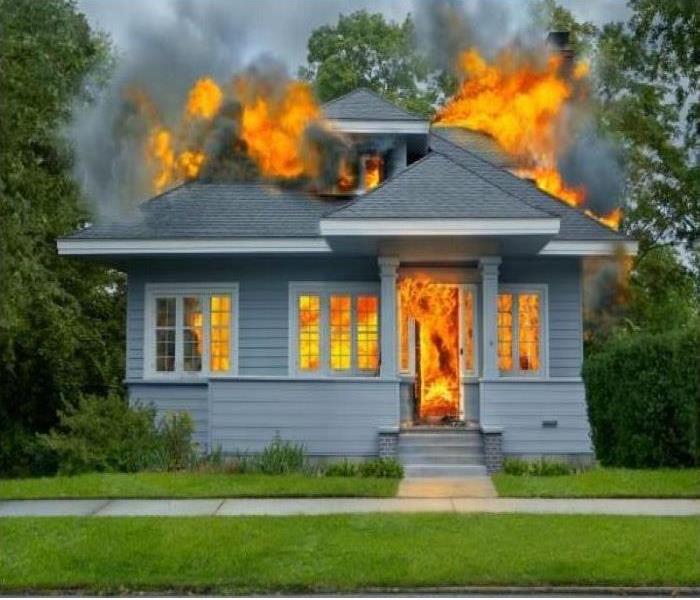 It takes less than 5 minutes for an entire house to be engulfed in flames.
It takes less than 5 minutes for an entire house to be engulfed in flames.
A disastrous house fire can start easily by misuse of heating equipment and household appliances. Here are some common causes of house fires and how to reduce risk.
- Although candles make a room smell good, they should never be left unattended. Always blow out a candle when leaving a room. Keep flammable objects away from the candle to avoid spreading the flame.
- Heating Equipment. Keep all objects clear of your heaters and vents. Curtains, blankets, and laundry can easily catch fire if they are too close.
- Be sure to smoke outside, if you smoke. A cigarette butt not properly put out can remain lit for hours!
- Electrical Equipment. Be aware of faulty or frayed wires on your appliances. Get them repaired as soon as possible, and unplug them and avoid using them. Overloading a power point can also cause an electrical fire, so be sure to check your adapters.
These are of course only some of the causes of house fires and other situations may put you at risk. It’s always good to check with your local fire marshal code to ensure your home is safe.
Tips to Reduce Home Fire Risk
12/8/2019 (Permalink)
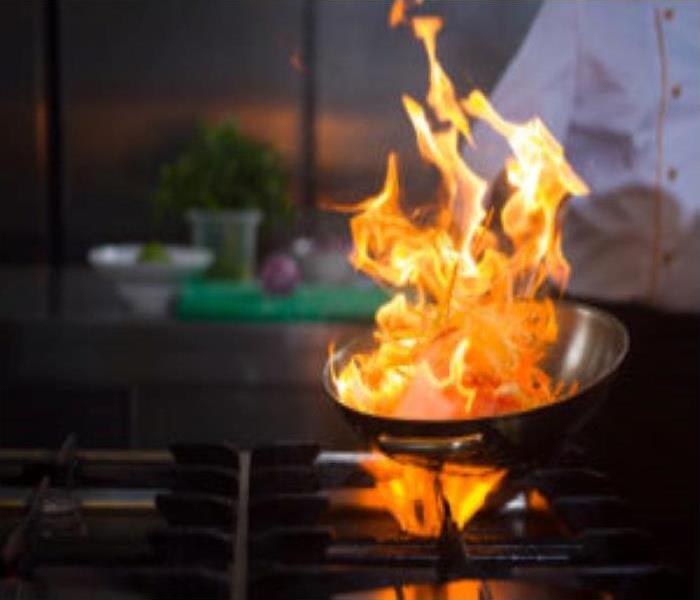 Always watch your food when cooking to avoid a fire
Always watch your food when cooking to avoid a fire
Fire departments across the United States respond to an average of 358,500 home fires every year! These fires caused billions in damage and resulted in several thousand civilian injuries. To avoid being part of a disaster like that, take the time to reduce your risk of a home fire. Check your smoke alarms and make sure that they have the proper battery life. You can easily test your smoke alarms by pressing the button on the surface. If it beeps weakly or not at all, it’s time to immediately change the batteries. Keep household items clear of your heating sources. Avoid having curtains or blankets directly touching these sources. Always keep an eye on any lit candles. If you are going to a different part of the house, blow out the candle. Watch what you are cooking in the kitchen! It’s possible for old food particles in the stove to set on fire or even the food you are cooking. Lastly, keep a fire extinguisher handy in case of the worst. However, if the worst does occur SERVPRO will speedily clean your home to leave it good as new.
Avoid Christmas Tree Fires
11/28/2019 (Permalink)
 Take the necessary actions to avoid Christmas tree fires
Take the necessary actions to avoid Christmas tree fires
We have a lot on our minds during the holiday season, between wrapping gifts, sending out cards, and spending time with the family, the dangers of un-watered Christmas tree can completely slip our minds! A well-watered Christmas tree is a must for the season because a dry tree can be quite flammable. Eliminating or mitigating the chance of a fire hazard is very important. Christmas tree fires can be very deadly too. According to the National Fire Protection Association(NFPA), one in thirty-two fires results in a death, making them even more deadly than house fires. Here are some quick tips to help in Christmas tree fire prevention.
- Keep the tree at least three feet away from heat sources
- Water the tree everyday with up to one gallon of water a day – the National Christmas Tree Association states one quart per inch of the trunks diameter
- Avoid any flickering candles or open flame sources too close to the tree
- Replace worn cords and loose bulbs
- Consider switching to an artificial tree
The Christmas tree is a fun tradition that has existed for generations and brings the family together, but be sure to keep an eye on your tree and take the necessary precautions to avoid the worst. However, if the worst does occur SERVPRO is there to help clean up and make it "Like it never even happened." Happy Holidays!
Avoiding costly fire damage.
11/25/2019 (Permalink)
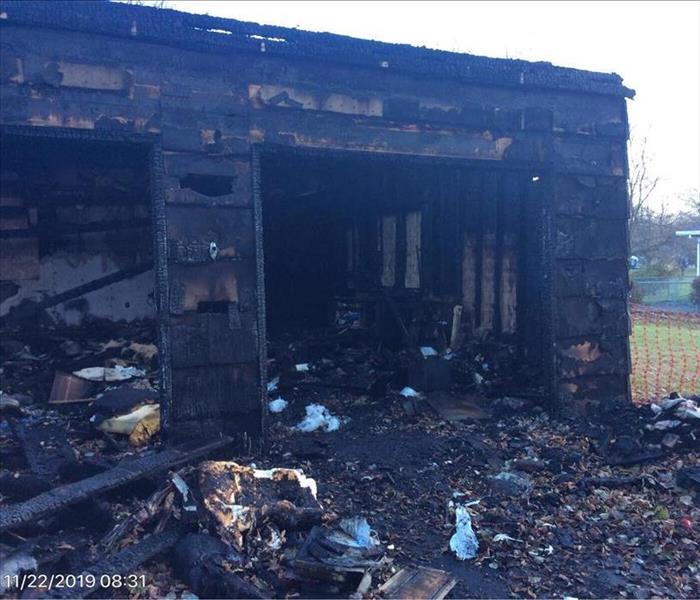 An unwatched heater caused extensive damage to this customers garage, but SERVPRO was there to help.
An unwatched heater caused extensive damage to this customers garage, but SERVPRO was there to help.
Here in Buffalo when the weather gets cold it is imperative to maintain your heating appliances properly. Always keep heaters and any flammable items away from flames. A lot of people here in Buffalo like to spend our Sundays watching football enjoying the company of friends and family. Please just remember to keep an eye on your heaters, they can cause costly fire damage and put a huge damper on your holiday season. Here at SERVPRO we are always here to help in case of any mishap. Please do not hesitate to call in the event something happens to your home, we are available 24/7. Here at SERVPRO we would like to wish everyone a safe and happy holiday season, and would like to thank you for choosing SERVPRO for all your fire restoration needs.
Removing smoke odor
6/19/2019 (Permalink)
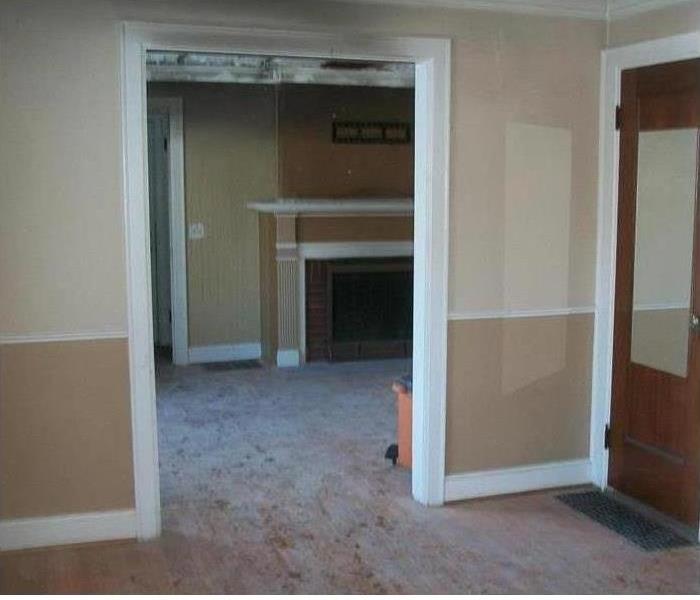 After a home fire, SERVPRO of Buffalo-Tonawanda came in to perform fire mitigation services.
After a home fire, SERVPRO of Buffalo-Tonawanda came in to perform fire mitigation services.
During a home fire, there are about a million troubles and worries that a homeowner face. Knowing how troublesome home emergencies are was the inspiration for SERVPRO of Buffalo-Tonawanda to become a thing. SERVPRO of Buffalo-Tonawanda partners with homeowners (and business owners too) to make fire damages “Like it never even happened.” But how do they take care of the aftermath of fire damages, like smoke damages?
Smoke damages are one branch of the different types of fire damages, but it is important to understand the behavior of smoke. Smoke rises to the upper levels of structures, so during the fire damage mitigation process, the SERVPRO of Buffalo-Tonawanda will examine upper levels of a structure to inspect the insulation. Insulation can trap smoke and allow the smell to linger, long past the fire. SERVPRO of Buffalo-Tonawanda’s team will remove the odorous insulation and then use special chemicals and cleaning techniques to remove the smell from a home. They partner with their clients through the whole process to alleviate all of their clients worries.
Restoring Your Collectibles After A Fire
6/19/2019 (Permalink)

Finding your pristine collection of 1950’s dolls or once-colorful beer steins covered in a dense layer of dark soot while inspecting your Buffalo residence after a fire can make you feel like the fire, and its effects invaded every aspect of your home. Even glass cabinets and other enclosures often permit smoke to find its way in and settle on the contents’ surfaces.
At SERVPRO, we take pride in helping our customers reclaiming their homes and their possessions. We lessen its effects by using approved methods we learn through our Institute of Inspection Cleaning and Restoration Certification (IICRC) training. Before, we cleaned such items by hand, which could produce excellent results, although taking an enormous amount of time to accomplish.
Instead, we now use ultrasonic technology to remove soot and other grime from your most prized possessions. Small imperfections can grip onto soot and make an unsightly, ugly mark that diminishes the beauty of such pieces in a collection. Cleaning by hand often left these defects marred. A short period in our ultrasonic water bath, however, cleans soot from every surface, including in between tightly abutted surfaces that face each other. This ability to clean blemishes and hairline cracks makes a tremendous difference in how your collection appears when you receive it back from us.
While still at your property, we carefully pack each item in its own piece of plain paper and place it inside a clean box. Taking these boxes to our facility also includes inventory sheets that correspond to each box. These sheets follow your items through the entire process. After the water bath, we place them in a drying chamber.
Although the cleaning method eliminates the soot that causes collectible items to smell like smoke, we still provide further deodorization. We do this inside the drying chamber without moving them. Handling them as little as possible reduces the chances of breakage. We then re-wrap each item and place it into a new box so we can return these items to you, along with their inventory sheets.
Fire Kitchen Damage
6/14/2019 (Permalink)
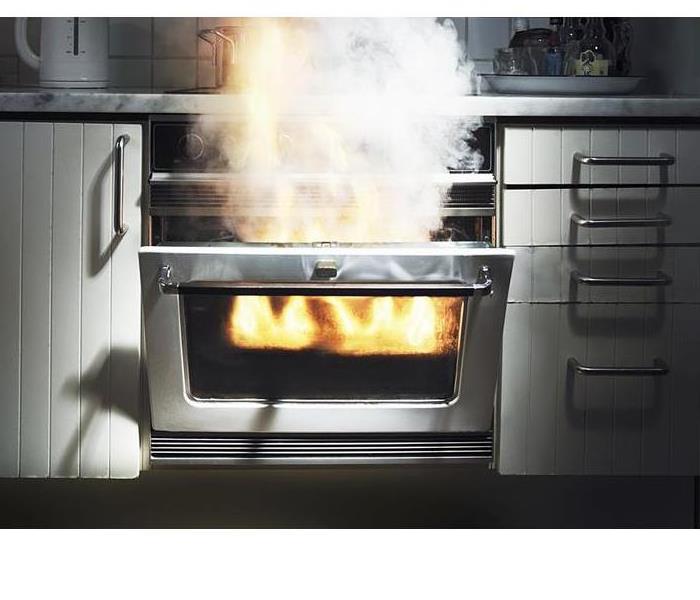 A kitchen fire
A kitchen fire
Every day at every 90 seconds a residential or commercial fire occurs in the United States. A kitchen fire and smoke damage has hidden damage and odors.
If you have a cooking fire here are some tips from National Fire Protection Association:
- Just get out! When you leave, close the door behind you to help contain the fire.
- Call 9-1-1 or the local emergency number after you leave.
- If you try to fight the fire, be sure others are getting out and you have a clear way out.
- Keep a lid nearby when you’re cooking to smother small grease fires. Smother the fire by sliding the lid over the pan and turn off the stovetop. Leave the pan covered until it is completely cooled.
- For an oven fire, turn off the heat and keep the door closed.
Our Fire specialists here at SERVPRO of Buffalo/Tonawanda have the experience and expertise to take care of any smoke or fire damage you may have no matter how big or small it might be. Special losses require special care, and we understand that caring for them is your first priority.
Restoration after a fire.
10/5/2018 (Permalink)
We’re not going to kid you. Fire damage restoration is tough work. People call SERVPRO of Buffalo-Tonawanda frequently to ask for advice on how to clean up after a fire. Here are seven of the best tips we give people who ask about fire damage restoration.
Most people can put these tips into practice. But remember that fire damage restoration takes time, work, and skill. Realistically consider whether you want to try these ideas on your own or whether you’d be better off hiring highly trained restoration specialists who will guarantee their work.
- Remove Smoke Damage
With any fire you’ll have a degree of smoke damage to your walls, wall paper, and paint. If the smoke damage is not too serious, you should be able to scrub it clean with detergents and bleach. Soot from smoke damage is greasy stuff, so always try to dust as much of it off from a surface before trying to scrub the surface clean. Often, you’ll want to repaint, but make sure all surfaces are clean and dry before you paint.
- Limit Activity & Other Simple Fire Damage Restoration Steps
Until your house is restored, limit your activity and movement in the house. This helps prevent soot particles from being embedded into upholstery and carpets. Keep people’s hands clean so you don’t further soil upholstery, walls, and woodwork. Protect your things by placing clean towels or old linens on rugs, upholstery, and carpet traffic areas. Before you clean know the best cleaning method for that particular cleaning job (one example: Clean and protect chrome with a light coating of petroleum jelly or oil.) Wash both sides of the leaves on your houseplants. Change your HVAC filter and tape double layers of cheesecloth over air registers.
- Get Rid of Mold & Mildew
Firefighters are great. They save many a live and many a home. But they do introduce mold and mildew into houses when they must use water to extinguish the fire. SERVPRO of Buffalo-Tonawanda highly recommends you hire fire damage restoration professionals to deal with mold and mildew. Mold and mildew can cause serious health problems. It’s difficult for a nonprofessional to know for certain if he’s clean up all the areas affected by the mold and mildew. And mold and mildew can contaminate your furniture, carpets, clothing, mattresses, walls, and vents. The best thing you can do immediately is to air out every room and clean out all vents and filters.
- Replace Carpets. Clean And Dry Your Floors
Your floors and carpets end up absorbing the worst of the damage from all the water used to put out a fire. In almost every case, SERVPRO of Buffalo-Tonawanda recommends that you pull up any carpets that have water damage and replace them. Water can also seep underneath vinyl flooring and into the cracks in hardwood. You must address this. If you have experience with flooring, you can lift it up and clean under it. But you may want to call a professional fire damage restoration company to assist you.
- Avoid Smearing Soot Into Clothing
Cleaning smoke damage from clothing is one of the biggest jobs you’ll have after a fire. Make sure you don’t smear the greasy soot into the clothing or just throw the smoky clothes into the wash. Often times dry cleaning is the best bet, and you should ask around local dry cleaners to see if any have experience with post-fire laundry. Removing smoke odor is another issue and we’ve covered it in another blog post.
- Scrub, Soak, And Cleaning Dishes
Dishes are also important items to clean thoroughly after a fire because they will be in contact with your food. Scrub all dishes well, let them soak in a solution of bleach and water (2 tablespoons of bleach per gallon) for at least 20 minutes and scrub some more for safety. When in doubt, if a dish, pot, or pan won’t come clean, cut your losses and throw it out – especially rubber or wooden dishes that absorb smoke.
Help Is Here
The team at SERVPRO of Eastern Niagara County also has specialized training and experience in fire restoration services, natural disaster prevention, water damage, chemical cleanup, and natural disaster cleanup. Call SERVPRO of Buffalo-Tonawanda at 716-694-9949
Fire Damage
9/28/2018 (Permalink)
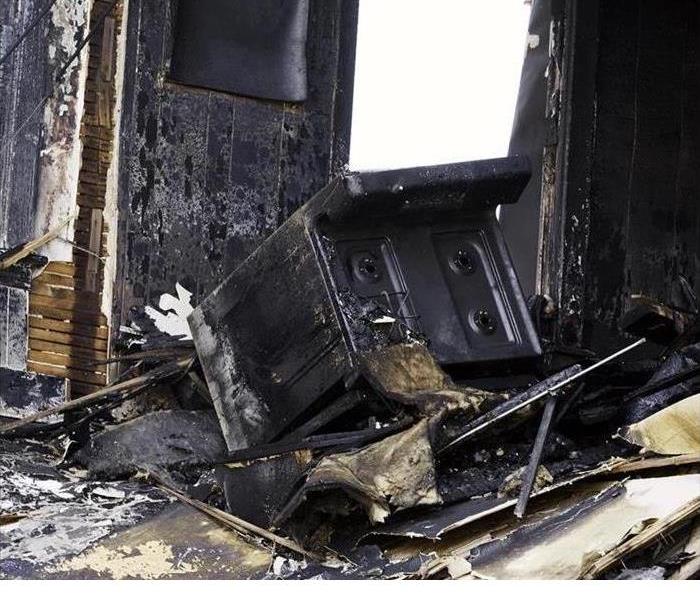 Kitchen fire in Buffalo, NY
Kitchen fire in Buffalo, NY
Damage caused by fire is varied. Different surfaces, textures, and materials react in different ways to the extreme temperature which makes restoration a nuanced and complex job. Using the wrong cleaning materials can at best, spread soot and smoke residues. At worst, it can cause further damage and require expensive replacement. After a blaze has been contained, there is the added risk of secondary water damage.
Properties that have fallen victim to fire damage should be pre-tested before any work begins. A pretestcan be carried out by a qualified SERVPRO fire technician who can measure affected areas for smoke damage. Although, smoke damage is visible, there are many different types which depend on the materials that burned.
Wet smoke, for example, burns at a low temperature and comes from synthetic materials that could be in appliances, lampshades or fabrics. This smoke, produced from melting plastics, has a pungent smell leaving behind thick, oily markings on walls and ceilings. Dry smoke, on the other hand, comes from natural materials like wood and paper leaving behind a powdery soot like texture.
A SERVPRO technician can conduct a pre-test that looks for different types of smoke residue. A pretest allows us to decide on the correct method of restoration as well as products that we should use to restore your items to pre-fire standards. Using a combination of wet cleaning and dry cleaning allows us to provide a professional focus to each affected area and guarantee the best results.
A fire restoration service by SERVPRO is two-fold. The first is your contents which can be removed,
tested and restored. The second is the structure itself, which involves removing soot and smoke
residue from your walls, ceilings, and permanent fittings. We can restore your walls, so they are
ready for repainting, as well as your floors, windows and, where possible, fabrics.
The final step is to deodorize. Burning materials leave thick smells that are not cleanable with
regular fresheners. Our equipment neutralizes the odor particles rather than merely covering the
smell. This approach is especially important when tackling synthetics which can release toxins when
subjected to fire. WE ARE HERE FOR YOU 24 HOURS A DAY, 7 DAYS A WEEK. CALL SERVPRO of Buffalo-Tonawanda, 716-694-9949.
Post Fire Cleanup Importance
9/28/2018 (Permalink)
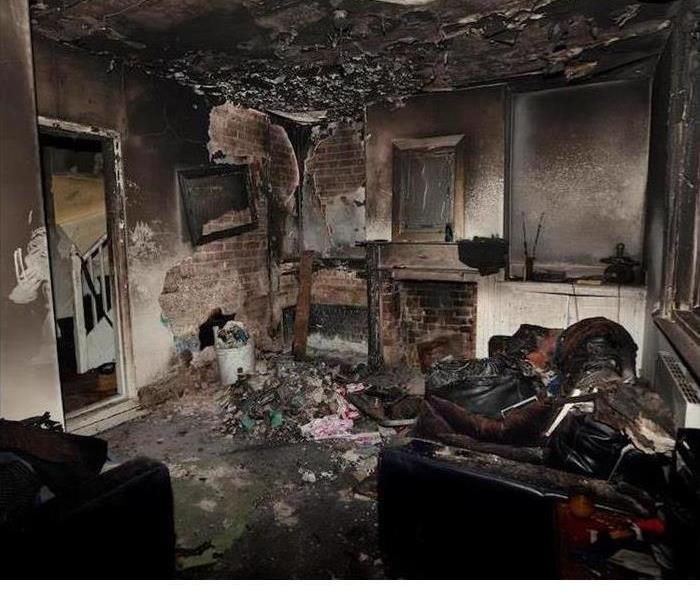
After a fire damage incident, it is understandable for any homeowner to be stressed. Such traumatic
events disrupt your professional or personal lives, and there is need to work closely with a
restoration service provider as you work towards returning your Minneapolis property to its earlier
state. It all starts by identifying what is able to be restored, and performing emergency services to limit further
damage.
Cleaning is one of the services that our SERVPRO team offers when attending to fire damaged
property. One of our goals is to reduce the fire damage claims. Remember, if you do not act quickly,
you might end up with expensive options such as replacing restorable items and resurfacing parts of
your structure. We are going to look at some of the principles of cleaning that we use when restoring
your materials.
Starting from the location where the fire originated from, our SERVPRO technicians carefully inspect
the site. During the inspection, we identify the various kinds of residues, and this helps us to come
up with an effective cleaning method. The cleaning process we choose should remove the smoke
residues efficiently and not cause any damage to the surface.
There are four essential elements we take into consideration to suspend and remove the smoke
residues: : temperature, agitation, time and chemical action. Our SERVPRO technicians understand
that chemical reactions increase as the temperature increases and thus we are keen to select an
appropriate degree of heat that corresponds well with our cleaning solution of choice. If we want to
dislodge smoke particles and distribute cleaning product on areas, we can use agitation. In this
process, we can use sonic vibrations, water and air pressure, brushes and towels.
Digesting, changing pH, oxidizing, dissolving, bleaching and emulsifying are some of the chemical
actions we take into consideration when cleaning your property. Depending on the action we desire,
we select a proper cleaning product. Time is also critical during restoration, and it is dependent on
the type of cleaning solutions we use and residues at the site.
At SERVPRO Buffalo-Tonawanda, WE ARE HERE FOR YOU 24 HOURS A DAY, SEVEN DAYS A
WEEK. LET US HELP YOU! We can be reached at 716-694-9949.
Smoke and Soot Clean up in WNY
5/25/2018 (Permalink)
Smoke and soot is very invasive and can penetrate various cavities within your home, causing hidden damage and odor. Our smoke damage expertise and experience allows us to inspect and accurately assess the extent of the damage to develop a comprehensive plan of action.
Smoke and soot facts:
- Hot smoke migrates to cooler areas and upper levels of a structure.
- Smoke flows around plumbing systems, seeping through the holes used by pipes to go from floor to floor.
- The type of smoke may greatly affect the restoration process.
Different Types of Smoke
There are two different types of smoke–wet and dry. As a result, there are different types of soot residue after a fire. Before restoration begins, SERVPRO of Buffalo / Tonawanda , Amherst/Clarence and East Erie County will test the soot to determine which type of smoke damage occurred. The cleaning procedures will then be based on the information identified during pretesting. Here is some additional information:
Wet Smoke – Plastic and Rubber
- Low heat, smoldering, pungent odor, sticky, smeary. Smoke webs are more difficult to clean.
Dry Smoke – Paper and Wood
- Fast burning, high temperatures, heat rises therefore smoke rises.
Protein Fire Residue – Produced by evaporation of material rather than from a fire
- Virtually invisible, discolors paints and varnishes, extreme pungent odor.
Our Fire Damage Restoration Services
Since each smoke and fire damage situation is a little different, each one requires a unique solution tailored for the specific conditions. We have the equipment, expertise, and experience to restore your fire and smoke damage. We will also treat your family with empathy and respect and your property with care.
Have Questions about Fire, Smoke, or Soot Damage?
Call Us Today – 716-694-9949
We are here for you : 24 hours/ 7 days a week
Grilling Safety
5/25/2018 (Permalink)
Warm spring days are upon us, and maybe you grill all year long or maybe you wait for these wonderful warm times of the year. Either way make sure you are following safety guidelines when firing up your grill so you can prevent a fire elsewhere. SERVPRO of Hayward wants you to have a safe summer!
Nearly 9,000 home fires a year involve grills, according to a National Fire Protection Association report. Of all the home fires involving grills, gas-fueled grills accounted for four out of five fires, while 16% involved charcoal or other solid-fueled grills.
A leak or break was the leading factor contributing to gas grill-related fires, according to the NFPA report.
- Check the gas cylinder hose for leaks before using it for the first time each year.
- Apply a light soap and water solution to the hose, which will quickly reveal escaping gas by releasing bubbles.
- If you smell or otherwise suspect a gas leak, and there is no flame, turn off the gas tank and grill. If the leak stops, get a professional to service it before using it again. Call the fire department if the leak does not stop.
- If you smell gas while cooking, get away from the grill immediately and call the fire department. Do not attempt to move the grill.
- Never turn on the gas when the lid is closed. The gas may build up inside, and when ignited, the lid could blow off and cause injuries or burns.
- After cooking, make sure you completely close the valve on your gas grill.
- Always store gas grills – and propane tanks – outside and away from your house.
- The leading cause of structure fires from use of charcoal grills was leaving or placing an object that could burn too close to the grill, according to the NFPA study.
- Charcoal grills can continue to remain hot for many hours after the flames extinguish. Avoid placing any burnable objects near the grill or moving the grill while the coals are hot. Keep combustible items that may be blown by the wind away from the grill.
- Check for rust damage in metal grills, which may make it possible for charcoal to fall through onto surfaces below and cause a fire.
- Purchase the proper starter fluid. Store out of reach from children and away from heat sources.
- Do not add charcoal starter fluid when coals or kindling have already been ignited. Never use any other flammable or combustible liquid to get the fire started.
- If the fire is too low, rekindle with dry kindling and more charcoal if needed. Avoid adding liquid fuel because it can cause a flash fire.
- Do not leave the grill unattended.
- SERVPRO is here to help you if you need us! 716-694-9949
Grilling Safety
5/25/2018 (Permalink)
Warm spring days are upon us, and maybe you grill all year long or maybe you wait for these wonderful warm times of the year. Either way make sure you are following safety guidelines when firing up your grill so you can prevent a fire elsewhere. SERVPRO of Hayward wants you to have a safe summer!
Nearly 9,000 home fires a year involve grills, according to a National Fire Protection Association report. Of all the home fires involving grills, gas-fueled grills accounted for four out of five fires, while 16% involved charcoal or other solid-fueled grills.
A leak or break was the leading factor contributing to gas grill-related fires, according to the NFPA report.
- Check the gas cylinder hose for leaks before using it for the first time each year.
- Apply a light soap and water solution to the hose, which will quickly reveal escaping gas by releasing bubbles.
- If you smell or otherwise suspect a gas leak, and there is no flame, turn off the gas tank and grill. If the leak stops, get a professional to service it before using it again. Call the fire department if the leak does not stop.
- If you smell gas while cooking, get away from the grill immediately and call the fire department. Do not attempt to move the grill.
- Never turn on the gas when the lid is closed. The gas may build up inside, and when ignited, the lid could blow off and cause injuries or burns.
- After cooking, make sure you completely close the valve on your gas grill.
- Always store gas grills – and propane tanks – outside and away from your house.
- The leading cause of structure fires from use of charcoal grills was leaving or placing an object that could burn too close to the grill, according to the NFPA study.
- Charcoal grills can continue to remain hot for many hours after the flames extinguish. Avoid placing any burnable objects near the grill or moving the grill while the coals are hot. Keep combustible items that may be blown by the wind away from the grill.
- Check for rust damage in metal grills, which may make it possible for charcoal to fall through onto surfaces below and cause a fire.
- Purchase the proper starter fluid. Store out of reach from children and away from heat sources.
- Do not add charcoal starter fluid when coals or kindling have already been ignited. Never use any other flammable or combustible liquid to get the fire started.
- If the fire is too low, rekindle with dry kindling and more charcoal if needed. Avoid adding liquid fuel because it can cause a flash fire.
- Do not leave the grill unattended.
- SERVPRO is here to help you if you need us! 716-694-9949
Smoke, Soot Particles and Odors? You need SERVPRO
2/19/2018 (Permalink)
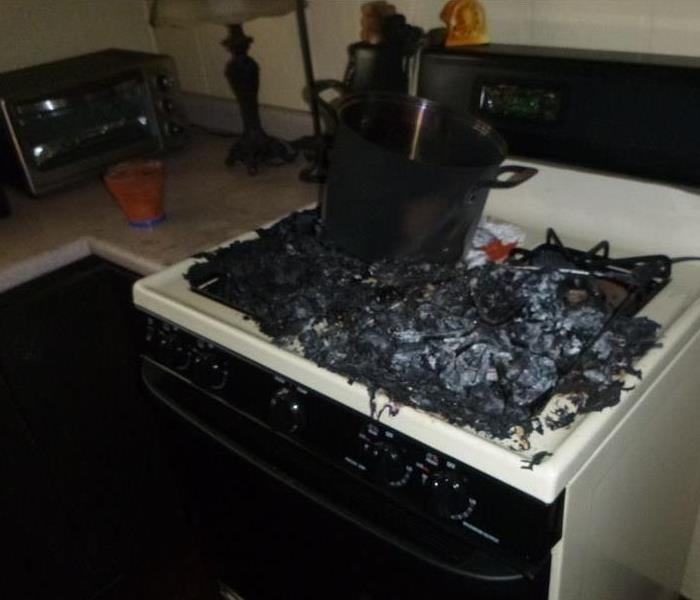 Kitchen fire
Kitchen fire
Fire damage to your home can be a traumatic experience for any homeowner. Apart from the damage due to heat, fire can cause significant damage to your property and belongings due to smoke and soot. The smoke particles can coat walls, ceilings, and almost any surface and cause permanent damage if not cleaned quickly and efficiently.
The particles in the smoke contain unburned carbon that can be very difficult to remove after a fire to your Williamsville home. Not all soot particles are alike and it takes a multi-step process to eliminate them. It is a job for the professionals who have years of training and expertise in fire damage restoration.
We’re Fire and Water Damage Specialists
As fire and water restoration specialists, we have the training, experience and specialized equipment necessary to restore your home or business. We are committed to providing superior service while restoring your property back to pre-fire condition.
- Fire & Smoke Restoration Technician
- Odor Control Technician
- Upholstery & Fabric Cleaning Technician
- Water Damage Restoration Technician
Call SERVPRO of Buffalo-Tonawanda 716-694-9949
School Fire in Buffalo, NY. SERVPRO of BUFFALO-TONAWANDA TO THE RESCUE.
10/17/2016 (Permalink)
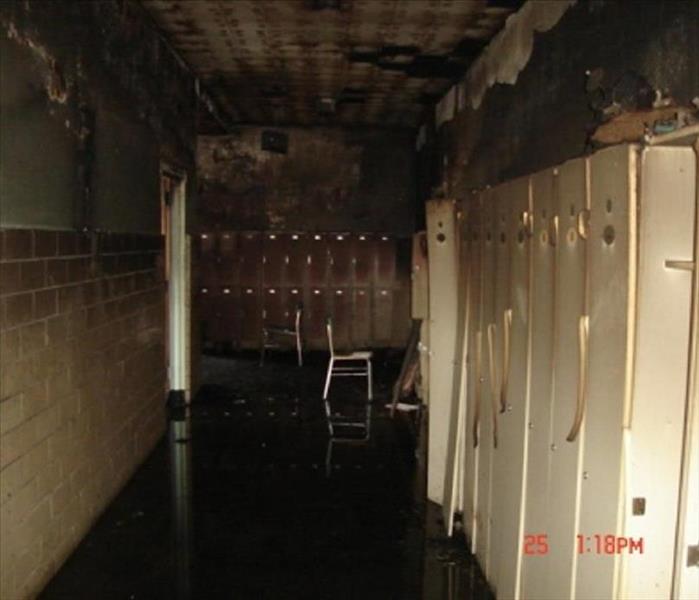 School Fire in Buffalo, NY. Cleaning performed by SERVPRO of BUFFALO-TONAWANDA 716-694-9949
School Fire in Buffalo, NY. Cleaning performed by SERVPRO of BUFFALO-TONAWANDA 716-694-9949
Flooding and water damage events at commercial properties are often complex with numerous issues that require a knowledgeable and flexible response. Whether we’re dealing with a relatively small water cleanup scenario or a large scale event, we work quickly to assess each unique situation and isolate the damaged area. In many instances, normal operations can continue in a temporary space while we restore your facility.
What To Do After A Fire
- Limit movement in the home to prevent soot particles from being embedded into upholstery and carpets.
- Keep hands clean so as not to further soil upholstery, walls and woodwork.
- Place clean towels or old linens on rugs, upholstery and carpet traffic areas.
- If electricity is off, empty freezer and refrigerator and prop doors open.
- Clean and protect chrome with light coating of petroleum jelly or oil.
- Wash houseplants on both sides of leaves.
- Change HVAC filter.
- Tape double layers of cheesecloth over air registers.
What NOT To Do After A Fire
- Don't attempt to wash any walls or painted surfaces or shampoo carpet or upholstery without contacting us.
- Don't attempt to clean any electrical appliances that may have been close to fire, heat or water without consulting an authorized repair service.
- Don't use any canned or packaged food or beverages that may have been stored near the fire, heat or water.
- Don't turn on ceiling fixtures if ceiling is wet. The wiring may be damaged.
- Don't send garments to an ordinary dry cleaner. Improper cleaning may set smoke odor.
SERVPRO of BUFFALO-TONAWANDA 716-694-9949
 Celebrate Thanksgiving safely! Follow our fire safety tips to protect your home and loved ones during the holiday. Learn more today!
Celebrate Thanksgiving safely! Follow our fire safety tips to protect your home and loved ones during the holiday. Learn more today!






 24/7 Emergency Service
24/7 Emergency Service




























